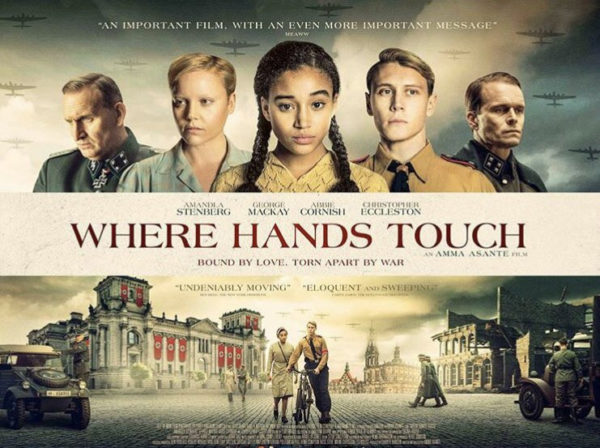Where Hands Touch, 2018.
Directed by Amma Asante.
Starring Amandla Stenberg, George MacKay, Abbie Cornish, Christopher Eccleston and Tom Sweet.
SYNOPSIS:
A biracial German girl is persecuted for the colour of her skin during the Second World War, but begins a romance with a Hitler Youth boy in the final years of the conflict.
With the excellent double whammy of Belle in 2013 and A United Kingdom in 2016, British filmmaker Amma Asante has proven herself to be one of the most adept voices in telling complex historical stories in which racial identity plays a key part. Her latest, and perhaps most ambitious, film is Where Hands Touch – a tale of interracial romance set against the backdrop of the dying days of Nazi Germany.
Amandla Stenberg, who was so brilliant in last year’s incendiary The Hate U Give, plays Leyna – one of the so-called ‘Rhineland Bastards’ born of relationships between German women and French forces of African descent who occupied the region after the First World War. Her mother Kerstin (Abbie Cornish) takes her and younger brother Koen (Tom Sweet) to Berlin, in the hope that she will be in less danger there. False papers claiming Leyna has been sterilised in line with barbaric Nazi policies do not prevent her from being pulled out of school and forced to work in a factory. She meets Hitler Youth boy Lutz (George MacKay) – son of Christopher Eccleston’s high-ranking soldier – and they begin a clandestine romance, as the net begins to close in around Germany.
Controversy has followed Where Hands Touch since its first official photo triggered a debate about whether the film’s central conceit romanticised Nazis by humanising them. That debate is something of a red herring, as Asante’s movie is far from a soft-soaped take on Hitler’s views. Lutz is not a ‘nice Nazi’ and is instead desperate to be sent to the frontline, expressing antisemitic views and baffling his father, who Eccleston plays as a First World War vet keen to do whatever it takes to survive, rather than be forced to witness violence and death all over again. This is a film about identity, more than ideology, with Leyna desperate to affirm her identity as a German, even when it pushes her into conflict with her mother, who rubbishes Nazi indoctrination and secretly tunes in to British news broadcasts.
Indeed, Leyna’s disputed status is a key pillar of the film’s core debate, as telegraphed by the James Baldwin quote that opens the film. The story explicitly states that she is treated with far more mercy than if she were Jewish, but she’s also never welcomed into the German regime she craves to be a part of, dismissed with every racial epithet under the sun. When she ultimately ends up in a labour camp, she’s forced to work under inhumane conditions, but she appears safe from the thick, omnipresent black smoke billowing from the death camp next door. Her identity is fractured, and her love for Lutz complicates matters only more.
Stenberg has proven herself to be a terrific performer in recent years, elevating the handful of YA-style romances in which she has appeared, as well as shining in the aforementioned The Hate U Give. She’s excellent here, even when Asante’s script occasionally deals in overly didactic statements and overwrought romantic clichés. Abbie Cornish is strong too, though she fares less well with the cod-German accents the entire cast uses, while George MacKay seems to be permanently a step behind, as if he’s not quite in line with the material.
The film in general seems off-pace when it focuses on the central romance, hoping the overly searching score can play the audience’s heartstrings like a harp to mask the failings in the storytelling. There’s an enjoyable sweetness in the bond between Lutz and Leyna, but it never feels as strong as the narrative requires it to be and the emotional twists and turns of the third act are considerably wide of the mark.
As with most of Asante’s more accomplished work, this is a movie that works best when it focuses on its core themes of racial identity and intolerance in society. Where Hands Touch certainly doesn’t deserve its viral meme infamy – it’s a far more nuanced movie than that suggests – but it also will not join the pantheon of its director’s finest moments.
Flickering Myth Rating – Film: ★ ★ ★ / Movie: ★ ★
Tom Beasley is a freelance film journalist and wrestling fan. Follow him on Twitter via @TomJBeasley for movie opinions, wrestling stuff and puns.















